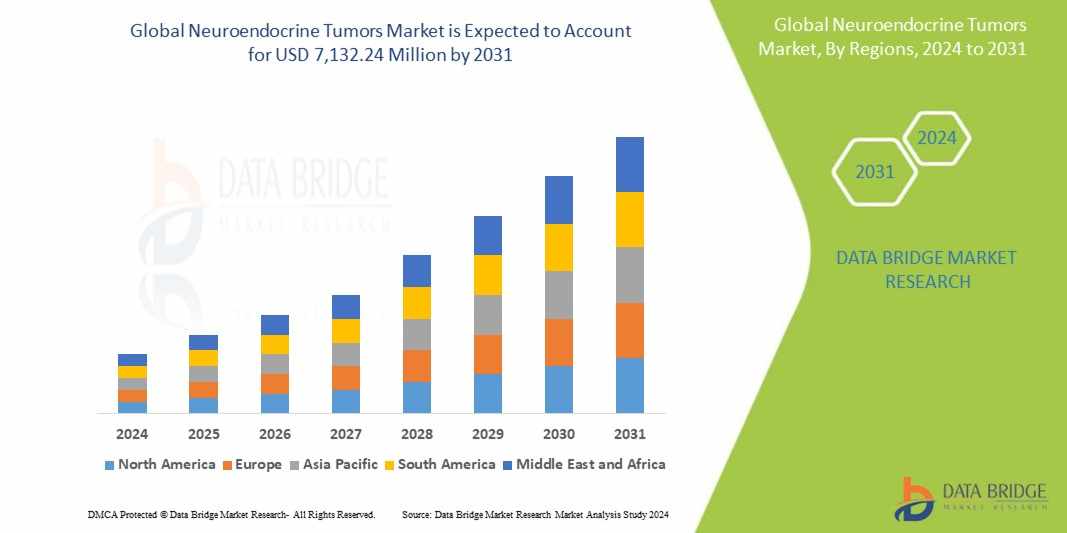
"Neuroendocrine Tumors Market Size And Forecast by 2031
According to Data Bridge Market Research Data Bridge Market Research analyses that the global neuroendocrine tumors market, which was USD 3,232.02 million in 2023, is expected to reach 7,132.24 million by 2031, at a CAGR of 10.4% during the forecast period 2024 to 2031.
Neuroendocrine Tumors Market is making significant strides in the industry with its latest advancements and strategic expansions. As a leading player, Neuroendocrine Tumors Market continues to revolutionize the sector with cutting-edge solutions and a commitment to excellence. The company’s recent initiatives have strengthened NETs Treatment Market position in the global market, driving growth and innovation. With a strong focus on customer satisfaction, Endocrine Cancer Market has introduced new products and services designed to meet the evolving demands of consumers. By leveraging advanced technologies, Rare Tumor Therapy Market is set to redefine industry standards and enhance its competitive edge.
Neuroendocrine Tumors Market remains dedicated to sustainability and market leadership through innovative approaches. The company has expanded its operations, ensuring Hormone-Secreting Tumors Market footprint grows across multiple regions. With increasing demand, Neuroendocrine Tumors Market is investing in research and development to drive continuous improvement. The latest reports highlight Neuroendocrine Tumors Market impressive performance, reinforcing its role as a market leader. Moving forward, Pancreatic Neuroendocrine Tumors Market aims to strengthen its impact through sustainable and customer-centric solutions.
Our comprehensive Neuroendocrine Tumors Market report is ready with the latest trends, growth opportunities, and strategic analysis. https://www.databridgemarketresearch.com/reports/global-neuroendocrine-tumors-market
Segments
- By Site of Origin:
Neuroendocrine tumors are categorized based on their site of origin, including Pancreas, Lungs, Gastrointestinal Tract, and Others. Pancreatic neuroendocrine tumors are the most common type and are known for their slow-growing nature. Lung neuroendocrine tumors are another prevalent type, with various subtypes like typical carcinoid, atypical carcinoid, small cell carcinoma, and large cell neuroendocrine carcinoma. Gastrointestinal neuroendocrine tumors can originate from the stomach, intestines, appendix, or rectum.
- By Diagnosis:
The market is segmented by Diagnosis into Biopsy, Blood Tests, Imaging Tests, Molecular Testing. Biopsy is a crucial diagnostic tool for confirming the presence of neuroendocrine tumors and determining their grade and type. Blood tests are used to measure markers like Chromogranin A and Neuron-Specific Enolase, which can indicate the presence of these tumors. Imaging tests such as CT scans, MRI scans, and PET scans help in visualizing the tumors and determining their size and location. Molecular testing is increasingly being used to identify specific genetic mutations associated with neuroendocrine tumors.
- By Treatment:
Treatment options for neuroendocrine tumors include Surgery, Chemotherapy, Radiation Therapy, Targeted Therapy, Hormone Therapy, Immunotherapy. Surgery is the primary treatment for localized neuroendocrine tumors and involves removing the tumor and surrounding tissue. Chemotherapy and radiation therapy are used to kill cancer cells and shrink tumors. Targeted therapy drugs like Everolimus and Sunitinib specifically target cancer cells without harming normal cells. Hormone therapy is effective for tumors that produce hormones, while immunotherapy helps the immune system fight cancer cells.
Market Players
- Novartis AG:
Novartis is a leading pharmaceutical company that offers targeted therapies for neuroendocrine tumors. Its drugs like Everolimus (Afinitor) and Lanreotide (Somatuline) areNovartis AG is a prominent market player in the field of neuroendocrine tumor treatment, offering innovative therapies and medications that have significantly impacted the market landscape. The company's focus on targeted therapies has provided healthcare professionals with effective treatment options for managing neuroendocrine tumors. Novartis' drug Everolimus (Afinitor) has demonstrated efficacy in treating advanced pancreatic neuroendocrine tumors, prolonging progression-free survival and showing promising results in clinical trials. This targeted therapy inhibits the mTOR pathway, which is often dysregulated in neuroendocrine tumors, thereby controlling tumor growth and progression.
Another key drug in Novartis' portfolio for neuroendocrine tumors is Lanreotide (Somatuline), a somatostatin analog used to manage symptoms associated with functional neuroendocrine tumors. Lanreotide has shown efficacy in controlling hormone hypersecretion and reducing tumor size in patients with gastroenteropancreatic neuroendocrine tumors. The drug's prolonged-release formulation offers convenience for patients and healthcare providers, enhancing treatment adherence and outcomes.
Novartis' commitment to research and development in the field of neuroendocrine tumors has led to the introduction of novel treatment approaches that address the specific characteristics of these tumors. The company's investment in precision medicine and molecular testing has enabled the identification of genetic mutations and biomarkers that can guide treatment decisions and improve patient outcomes. By leveraging cutting-edge technologies and collaborations with leading academic institutions and research organizations, Novartis continues to drive advancements in personalized medicine for neuroendocrine tumors.
In addition to its pharmaceutical innovations, Novartis plays a vital role in raising awareness about neuroendocrine tumors and supporting education and advocacy initiatives for patients and healthcare professionals. The company's comprehensive approach to disease management encompasses not only drug development but also patient support programs, healthcare provider training, and collaborative research efforts to enhance the standard of care for neuroendocrine tumor patients worldwide.
Overall, Novartis AG's leadership in the neuroendocrine tumor market is characterizedNovartis AG has established itself as a prominent market player in the field of neuroendocrine tumor treatment, offering innovative therapies and medications that have significantly impacted the market landscape. The company's strategic focus on targeted therapies for neuroendocrine tumors has provided healthcare professionals with effective treatment options for managing these complex and heterogeneous tumors. By developing drugs like Everolimus (Afinitor) and Lanreotide (Somatuline), Novartis has demonstrated its commitment to addressing the diverse needs of patients with neuroendocrine tumors.
One key strength of Novartis in the neuroendocrine tumor market is its investment in research and development. The company has dedicated significant resources to advancing the understanding of the underlying molecular mechanisms of neuroendocrine tumors, leading to the development of targeted therapies that specifically address the pathways involved in tumor growth and progression. By leveraging cutting-edge technologies and collaborating with key stakeholders in the scientific community, Novartis has been able to introduce novel treatment approaches that offer new hope for patients with neuroendocrine tumors.
Furthermore, Novartis' portfolio of neuroendocrine tumor drugs reflects its commitment to personalized medicine. By emphasizing the importance of molecular testing and genetic profiling in treatment decision-making, Novartis is at the forefront of tailoring therapies to the individual characteristics of each patient's tumor. This precision medicine approach not only improves treatment outcomes but also minimizes the potential for adverse effects by targeting cancer cells while sparing healthy tissues.
In addition to its pharmaceutical innovations, Novartis has
DBMR Cloud-connected intelligence: Bridging the gap with revenue-impacting solutions
DBMR Cloud is a connected intelligence platform that uses a neural network to analyze and integrate macro and micro-level data, bridging the gap between data analytics, market research, and strategy for profound growth and revenue impact.
Get More Detail: https://www.databridgemarketresearch.com/nucleus/global-neuroendocrine-tumors-market
The market is highly fragmented, with a mix of global and regional players competing for market share. To Learn More About the Global Trends Impacting the Future of Top 10 Companies in Neuroendocrine Tumors Market : https://www.databridgemarketresearch.com/reports/global-neuroendocrine-tumors-market/companies
Key Questions Answered by the Global Neuroendocrine Tumors Market Report:
What is the current state of the Neuroendocrine Tumors Market, and how has it evolved?
What are the key drivers behind the growth of the Neuroendocrine Tumors Market?
What challenges and barriers do businesses in the Neuroendocrine Tumors Market face?
How are technological innovations impacting the Neuroendocrine Tumors Market?
What emerging trends and opportunities should businesses be aware of in the Neuroendocrine Tumors Market?
Browse More Reports:
https://www.databridgemarketresearch.com/reports/asia-pacific-neuroendocrine-tumors-market
https://www.databridgemarketresearch.com/reports/europe-neuroendocrine-tumors-market
https://www.databridgemarketresearch.com/reports/middle-east-and-africa-neuroendocrine-tumors-market
https://www.databridgemarketresearch.com/reports/north-america-neuroendocrine-tumors-market
Data Bridge Market Research:
☎ Contact Us:
Data Bridge Market Research
US: +1 614 591 3140
UK: +44 845 154 9652
APAC: +653 1251 984

















Write a comment ...